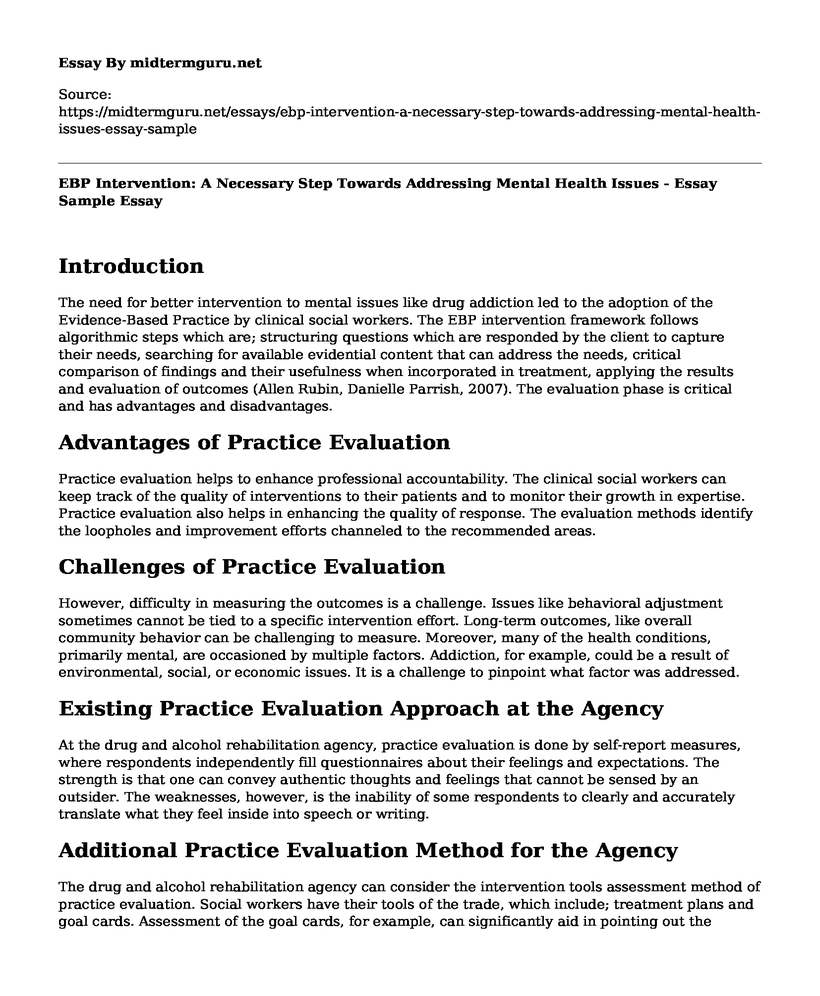Introduction
The need for better intervention to mental issues like drug addiction led to the adoption of the Evidence-Based Practice by clinical social workers. The EBP intervention framework follows algorithmic steps which are; structuring questions which are responded by the client to capture their needs, searching for available evidential content that can address the needs, critical comparison of findings and their usefulness when incorporated in treatment, applying the results and evaluation of outcomes (Allen Rubin, Danielle Parrish, 2007). The evaluation phase is critical and has advantages and disadvantages.
Advantages of Practice Evaluation
Practice evaluation helps to enhance professional accountability. The clinical social workers can keep track of the quality of interventions to their patients and to monitor their growth in expertise. Practice evaluation also helps in enhancing the quality of response. The evaluation methods identify the loopholes and improvement efforts channeled to the recommended areas.
Challenges of Practice Evaluation
However, difficulty in measuring the outcomes is a challenge. Issues like behavioral adjustment sometimes cannot be tied to a specific intervention effort. Long-term outcomes, like overall community behavior can be challenging to measure. Moreover, many of the health conditions, primarily mental, are occasioned by multiple factors. Addiction, for example, could be a result of environmental, social, or economic issues. It is a challenge to pinpoint what factor was addressed.
Existing Practice Evaluation Approach at the Agency
At the drug and alcohol rehabilitation agency, practice evaluation is done by self-report measures, where respondents independently fill questionnaires about their feelings and expectations. The strength is that one can convey authentic thoughts and feelings that cannot be sensed by an outsider. The weaknesses, however, is the inability of some respondents to clearly and accurately translate what they feel inside into speech or writing.
Additional Practice Evaluation Method for the Agency
The drug and alcohol rehabilitation agency can consider the intervention tools assessment method of practice evaluation. Social workers have their tools of the trade, which include; treatment plans and goal cards. Assessment of the goal cards, for example, can significantly aid in pointing out the progress of rehabilitation (Waters, 2017). Additionally, informal-interactive tools like a consultation with colleagues and client feedback can be used to assess clinical social work practice (Thomas D. Davis1, Cory B. Dennis1, Susan E. Culbertson, 2015).
The Single-System Design Approach of Evaluating Clinical Outcomes
The single-system design of outcome evaluation already exists at the drug and alcohol rehabilitation agency. The data obtained is relative to individual differences. The self-report system exists as a single-system design to supply official data from different individuals.
References
Allen Rubin, Danielle Parrish. (2007). Challenges to the Future of Evidence-Based Practice in Social Work Education. Journal of Social Work Education.
Thomas D. Davis1, Cory B. Dennis1, Susan E. Culbertson. (2015). Practice Evaluation Strategies Among Clinical Social Workers: New Directions in Practice Research. Research on Social Work Practice.
Waters, I., (2017). Social Work Practice & Assessment Tools. Career Trend.
Cite this page
EBP Intervention: A Necessary Step Towards Addressing Mental Health Issues - Essay Sample. (2023, Jan 23). Retrieved from https://midtermguru.com/essays/ebp-intervention-a-necessary-step-towards-addressing-mental-health-issues-essay-sample
If you are the original author of this essay and no longer wish to have it published on the midtermguru.com website, please click below to request its removal:
- Review of the Womens Health Initiative Article
- Women's Rights, Animal Rights and Euthanasia Paper Example
- Paper Example on Pathophysiology of Diabetes Mellitus
- The Myers Briggs Type Indicator - Paper Example
- Paper Example on Institutional Discrimination and Affirmative Action
- Determinism: Uncontrollable Causes of Human Behavior - Essay Sample
- A Career of Rigor: Nursing Demands Dedication & Compassion - Essay Sample







